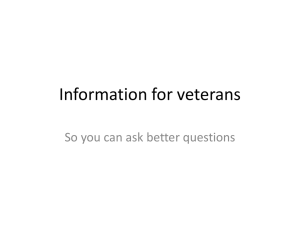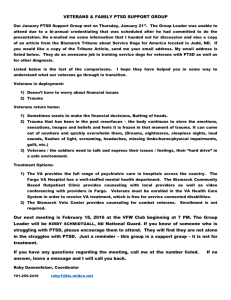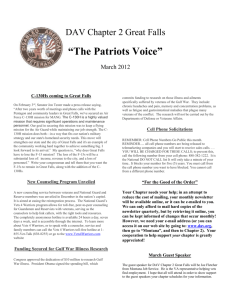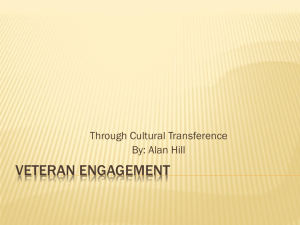A Vet's Guide to Post
advertisement
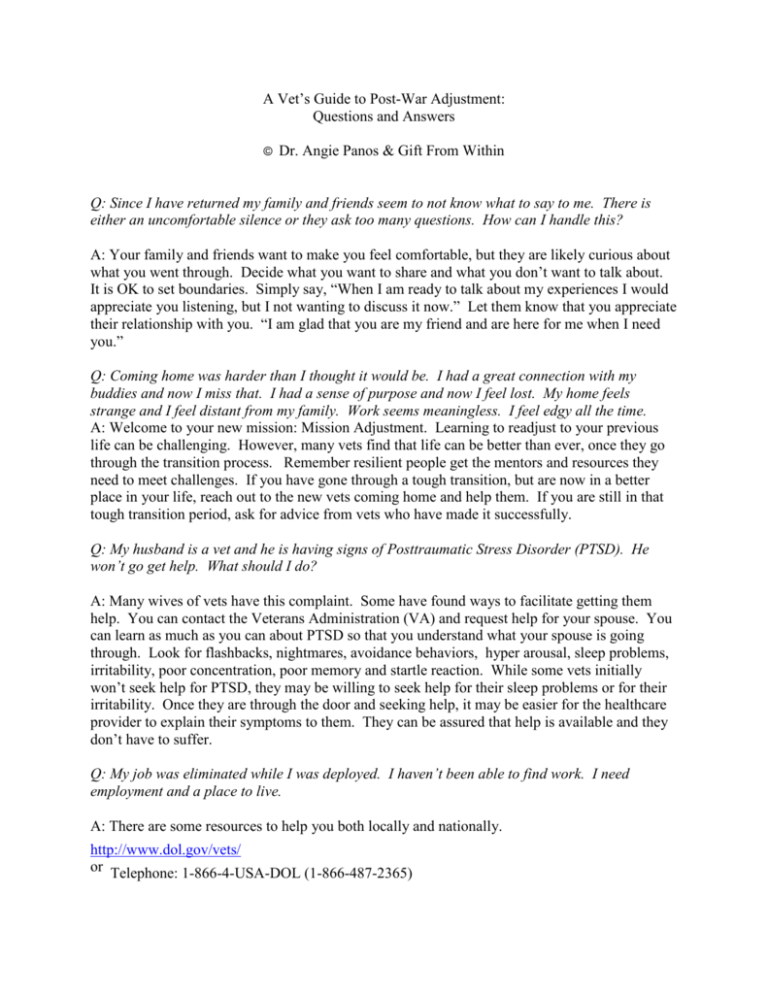
A Vet’s Guide to Post-War Adjustment: Questions and Answers © Dr. Angie Panos & Gift From Within Q: Since I have returned my family and friends seem to not know what to say to me. There is either an uncomfortable silence or they ask too many questions. How can I handle this? A: Your family and friends want to make you feel comfortable, but they are likely curious about what you went through. Decide what you want to share and what you don’t want to talk about. It is OK to set boundaries. Simply say, “When I am ready to talk about my experiences I would appreciate you listening, but I not wanting to discuss it now.” Let them know that you appreciate their relationship with you. “I am glad that you are my friend and are here for me when I need you.” Q: Coming home was harder than I thought it would be. I had a great connection with my buddies and now I miss that. I had a sense of purpose and now I feel lost. My home feels strange and I feel distant from my family. Work seems meaningless. I feel edgy all the time. A: Welcome to your new mission: Mission Adjustment. Learning to readjust to your previous life can be challenging. However, many vets find that life can be better than ever, once they go through the transition process. Remember resilient people get the mentors and resources they need to meet challenges. If you have gone through a tough transition, but are now in a better place in your life, reach out to the new vets coming home and help them. If you are still in that tough transition period, ask for advice from vets who have made it successfully. Q: My husband is a vet and he is having signs of Posttraumatic Stress Disorder (PTSD). He won’t go get help. What should I do? A: Many wives of vets have this complaint. Some have found ways to facilitate getting them help. You can contact the Veterans Administration (VA) and request help for your spouse. You can learn as much as you can about PTSD so that you understand what your spouse is going through. Look for flashbacks, nightmares, avoidance behaviors, hyper arousal, sleep problems, irritability, poor concentration, poor memory and startle reaction. While some vets initially won’t seek help for PTSD, they may be willing to seek help for their sleep problems or for their irritability. Once they are through the door and seeking help, it may be easier for the healthcare provider to explain their symptoms to them. They can be assured that help is available and they don’t have to suffer. Q: My job was eliminated while I was deployed. I haven’t been able to find work. I need employment and a place to live. A: There are some resources to help you both locally and nationally. http://www.dol.gov/vets/ or Telephone: 1-866-4-USA-DOL (1-866-487-2365) For Disabled Vets: The U.S. Department of Veterans Affairs supports a nationwide employment training program for service-connected disabled veterans who qualify for vocational rehabilitation. The U.S. Department of Labor (DOL), through its Veterans Employment Training Service (VETS), helps support a network of local employment service professionals who assist disabled veterans with locating and securing employment. Many of the National Veteran Service Organizations (VSOs), such as the American Legion, Veterans of Foreign Wars, Disabled American Veterans, AMVETS, Paralyzed Veterans Association, Blinded Veterans Association, Military Order of the Purple Heart, Vietnam Veterans of America and Non-Commissioned Officers Association, offer employment related services for disabled veterans (and in many cases all veterans) in various localities. In addition to job help there are resources for housing help: Contact them at (800) VET-HELP Go to the website: http://iava.org/ Q: I had a bad experience at the VA hospital and now it triggers my PTSD every time I try to go back there. Is there anything I can do? A: Yes, usually there are some providers that are located in the community or provide outreach from the VA. Call and talk to your local VA and ask to talk to the director of the PTSD program. Explain your concerns and they can facilitate a way you can get help. Q: I got the impression from my last counselor that there is no hope for me. Will I have to suffer with my symptoms of PTSD forever? A: No, absolutely not! There are a number of effective therapies to reduce and relieve your symptoms. Don’t give up! Ask the VA for a therapist that specializes in the treatment of traumatic stress. Finding the right “fit” between you and a therapist is key for the success of your treatment. If you don’t feel that you have the right fit, seek out a provider that you feel more comfortable with. Q: I know I am not in a war zone anymore, but I feel like I am always “locked and loaded.” I have had some road rage and lashed out at people that are rude. My temper embarrasses my wife and kids. Will this get better over time? A: Switching off the fighting instinct is not easy. It is important to be aware of your stress level and know what to do to calm yourself when you start to get aggravated. Talk to your nonmilitary family and friends about what they do to calm themselves. Take frequent breaks to somewhere quiet and breathe deeply. Know what you need to do to decompress. Stress experts tell us that we should try to purposefully relax for a few minutes at least 5-6 times a day. This lowers the level of arousal in your nervous system. The more you practice calming yourself, the better you get at this new skill. Q: I have a different problem. I think I am addicted to that adrenaline rush feeling. So everything feels numb unless I am getting a thrill. I bought a bullet bike and I love the feeling of speed. My wife is furious with me. Is this normal? A: A number of vets express this concern and it likely affects far more returning soldiers than we know. Without giving you a complicated description of what is happening in your body and why this is a type of addictive process, suffice it to say that, yes, it is addictive. So just like other addictive behaviors that aren’t good for your health and well-being you need to keep these behaviors in check. Seek some professional support for this issue. Avoid giving into the urge to do activities that create an adrenaline rush but could be harmful. Q: I have a hard time relating to friends and family and prefer to be with my combat buddies. Is this normal? How long will this last? A: For quite some time your whole world has centered around common experiences and feelings with your combat buddies. It is no wonder that you find it easier to relate to them. Now, you must have some time to get reacquainted with your family and friends. Be patient with yourself and with others while you go through this transition. We will be adding additional questions and answers to this guide. More Resources: For Vets: Find your nearest VA hospital by calling 877-222-VETS Check out the Vet Center Readjustment Services Call the VFW or American Legion for Veteran support services Encourage your loved one to talk with other Veterans at IAVA.org For Partners and Families: Talk with other family and friends in the SupportYourVet.org forum Visit GiveAnHour.org for free mental health services Content may not be reproduced on websites without express permission. Please link instead.


